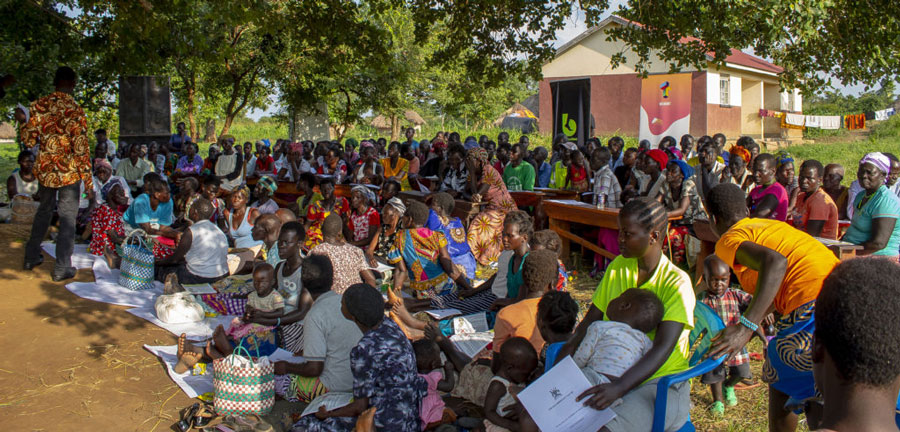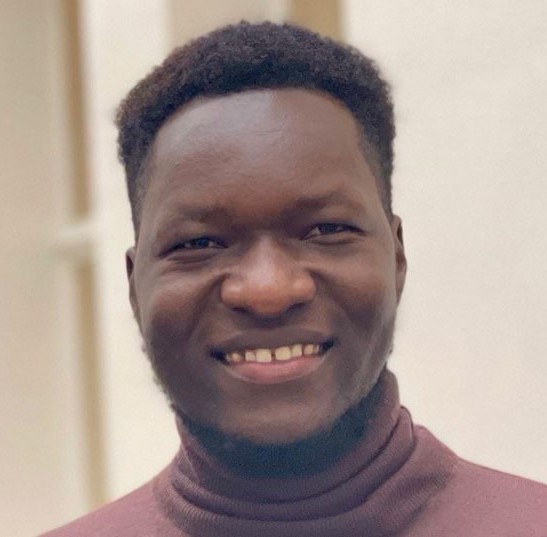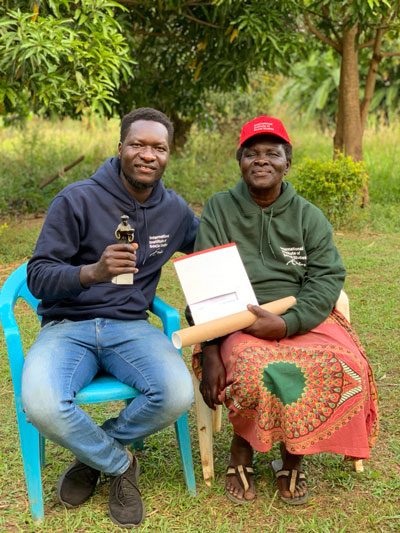Interview with Robert Okello, winner Africa Thesis Award 2022
 Robert Okello (MA Development Studies, International Institute of Social Studies) is the winner of the Africa Thesis Award 2022. He wrote his thesis on the legal empowerment of rural women through digital technology in Northern Uganda.
Robert Okello (MA Development Studies, International Institute of Social Studies) is the winner of the Africa Thesis Award 2022. He wrote his thesis on the legal empowerment of rural women through digital technology in Northern Uganda.
Five questions about his research.

Congratulations Robert. First, how did you come up with this subject for your thesis?
‘I have a background in digital technologies, and I am a social entrepreneur - a founding employee with Barefootlaw, a not-for-profit organisation in Uganda that provides free legal support and guidance to disadvantaged Ugandans that can’t afford legal help or don’t know how to navigate the legal system. It uses technology and innovation in addition to traditional methods like community outreach. I worked with rural women whom we provided with legal outreaches, sensitisation and training on how to use digital interventions to seek legal help. My mother was a beneficiary of these legal trainings. Since my father passed away in 2019, she has been involved in unending legal battles concerning my father’s inheritances (property, land) with relatives who believe she is not entitled. This is when I got first-hand experience with our own interventions at Barefootlaw. However, my mum, being a direct beneficiary, was still confronted with the complexities within the Ugandan legal systems. These prevented her from resolving the legal issues even after receiving legal support. So, while Barefootlaw’s digital interventions have made legal information easily available and access to a lawyer easy for the poor, I wanted to dig deeper to problematise any easy assumption that digital technologies in itself are a “silver bullet” to empower marginalised communities. Through the experiences of my mum and other rural women in Uganda, I wanted to interrogate how digital technologies interconnect with legal empowerment, with respect to access to justice.’
 How were you able to keep a professional distance to your research subject, given that your mother is in fact part of it?
How were you able to keep a professional distance to your research subject, given that your mother is in fact part of it?
‘Well, this is not only about my mother. Over 80 percent of people in Uganda face daily legal challenges one way or another. Yet, about 90 percent of the lawyers in Uganda are based in the capital city Kampala, while the most vulnerable communities are in the rural areas. Take the area where I come from, Gulu. Questions of land, domestic violence, family conflicts, business contracts and market related issues, and all of these issues connected – they are fertile breeding ground for conflicts. Gulu is also a post-war region, so people are still recovering from the effects of the war, there are lots of returnees, youngly abducted girls come back in the community but don’t have the skills to look after themselves, traumatic issues are wide-spread. And on top of that, traditional norms and cultures play a big role and still give men more rights, especially on matters of land ownership, reinforcing discrimination and violence against women. So providing disadvantaged communities, especially rural women, with free legal information through digital means is very welcome, and appears to be a great tool. But of course, there are many challenges too.’
Can you mention a few?
‘There is still a huge digital divide in Uganda and the whole of Africa so to say. Rural communities have limited IT infrastructure, and rural women remain the least connected. Internet is also very expensive. Moreover, not everyone can afford a computer, tablet, mobile phone, or even electricity. And many Ugandans do not trust lawyers. Getting legal services is associated with high legal fees, long court cases, paying bribes and sometimes corruption. So, especially in the rural communities, people don’t have the “agency” to seek legal redress in the institution of justice.’
How were you able to do the actual research, which took place during the pandemic?
‘Because of the travel restrictions, I had to do my research from a distance, so I worked with research assistants. We organised focus group discussions with rural women in the Gulu area, ten participants per group, and I would connect with them from The Hague via Zoom – that is: if able to connect to some rural areas.’
What is the main recommendation following from your research?
‘There is an enormous advantage that comes with the digital revolution. But we have to be mindful of the fact that not everyone is online. If we are building products that should benefit the most vulnerable groups within our communities, it should be people-centric. It should be easily accessible and able to reach possible outcomes for the justice needs of the users. We have to build more IT infrastructures in poorly connected areas, and offer digital skills training to ensure that no one is left behind.
Within development cooperation, actors such as the European Union, the US and other donors should focus more on engaging African actors on better approaches that work for the continent, such as building digital infrastructures, sharing knowledge and supporting Africa’s young digital ecosystems within e-health, e-economy, e-justice. We have a young population in Africa, but over 75 percent of people are still not connected to the internet. The government of Uganda must create a conducive environment for innovations and support efforts for positive digital transitions, this should really be a priority. You can’t talk about digitalisation of services without building a digitally connected community.’
Read Robert’s thesis: Rural women’s legal empowerment through digital technology: a case study from Northern Uganda, IISS, Erasmus University Rotterdam.
Text: Fenneken Veldkamp
Top photo: Barefootlaw women legal outreaches in Uganda.
Lower photo right: Robert Okello with his mother.

